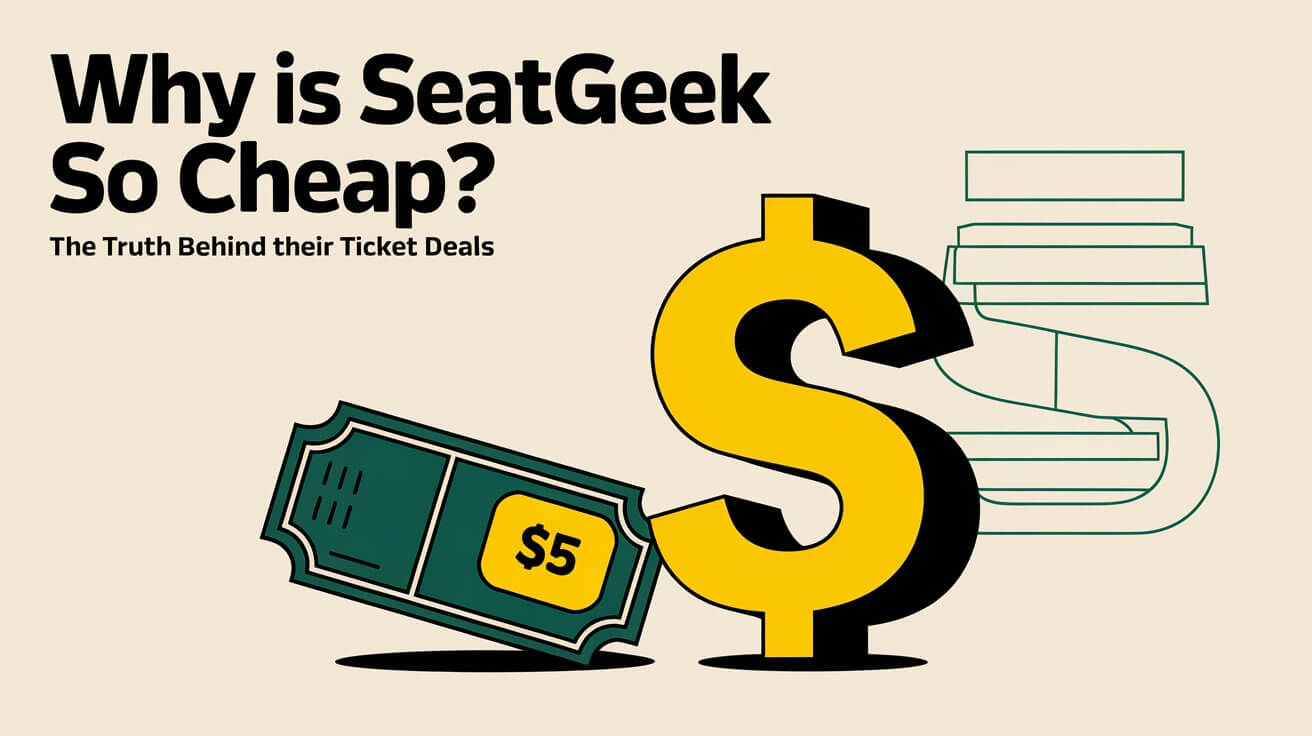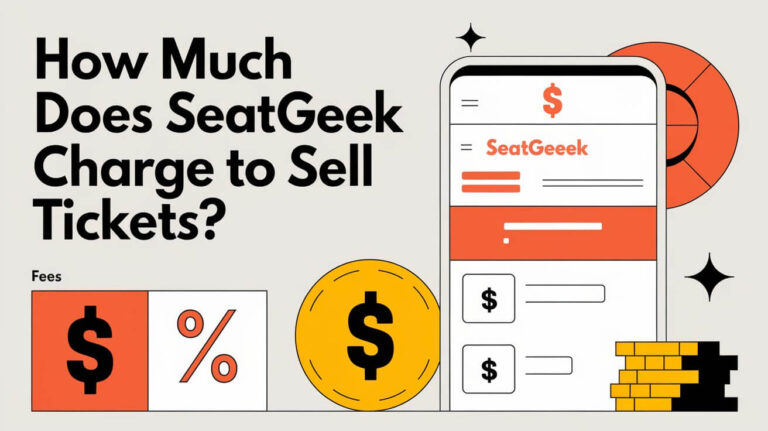
Finding affordable event tickets can be tough. Yet, SeatGeek stands out by offering SeatGeek pricing and ticket costs that are hard to beat. Its secret? A unique business model and cutting-edge technologies.
SeatGeek’s low prices stem from its access to resold tickets. These are originally bought by third-party sellers. They’re often cheaper on SeatGeek, especially when demand is low. This strategy allows SeatGeek to offer more SeatGeek discounts and savings.
SeatGeek also keeps costs down with lower service fees. This is compared to rivals like StubHub or Ticket Liquidator. Their clear fee structure means no hidden costs at checkout.
Despite being affordable, SeatGeek prioritizes legitimacy and customer safety. The “FanProtect” guarantee ensures tickets are genuine and refunds are available if needed. This gives buyers confidence in their purchase.
How SeatGeek’s Business Model Keeps Prices Low
SeatGeek’s innovative business model is crucial for offering competitive ticket prices. It employs a dynamic pricing strategy, adjusting prices in real-time based on market demand. This smart pricing technology ensures their rates remain attractive to consumers.
Dynamic Pricing Strategy
SeatGeek’s pricing approach is built on a dynamic pricing strategy. Advanced algorithms analyze event popularity, seating availability, and market conditions. This allows SeatGeek to adjust ticket prices up or down to align with demand, ensuring customers get the best deal.
Revenue Sharing with Venues
SeatGeek has established mutually beneficial partnerships with venues and event organizers through a revenue-sharing model. Instead of charging high fees, SeatGeek takes a smaller percentage of each ticket sale, sharing the revenue with its partners. This approach helps keep overall costs down for consumers.
Smart Pricing Technology
At the heart of SeatGeek’s pricing strategy is its advanced smart pricing technology. The company’s algorithms constantly analyze market trends, competitor pricing, and user behavior to determine optimal price points. This data-driven approach allows SeatGeek to offer tickets at prices that are both competitive and profitable.
SeatGeek’s unique business model combines dynamic pricing, revenue sharing, and smart technology. This model is key to providing consumers with affordable ticket options. By adapting to market conditions and prioritizing partnerships, SeatGeek keeps prices low while maintaining a sustainable and successful operation.
Why Is SeatGeek So Cheap Compared to Competitors
SeatGeek stands out in the ticket marketplace with its affordable prices. Its focus on customer experience drives innovative cost-saving strategies. This approach benefits consumers, making SeatGeek a more attractive option.
SeatGeek’s lower service fees are a major reason for its affordability. Unlike rivals like StubHub, SeatGeek emphasizes transparent pricing. This commitment to value sets it apart from competitors.
SeatGeek’s strategy in both primary and secondary ticket markets boosts its pricing advantage. Partnerships with major sports leagues and teams, such as the MLB and NFL, help negotiate better prices. These savings are then passed on to consumers.
| Event | SeatGeek Price | Competitor Price |
|---|---|---|
| 49ers vs. Packers | $207 | $202 (Vivid Seats) |
| Inter Miami vs. Real Salt Lake | $190 | $201 (Vivid Seats) |
| Twice Concert in Las Vegas | $81 | $86 (Vivid Seats) |
The table shows SeatGeek’s prices are often lower than those of competitors like Vivid Seats. This focus on affordability helps SeatGeek attract and keep customers. In the competitive ticket market, SeatGeek’s pricing strategy is a key advantage.
Service Fees and Hidden Costs Explained
For ticket buyers, the array of SeatGeek fees and hidden costs is a major concern. Yet, SeatGeek is dedicated to price transparency. They aim to show the total cost upfront, before any purchase is made.
Fee Structure Breakdown
SeatGeek’s fees include service charges from 10% to 15% of the ticket price. Delivery fees for electronic tickets range from $5 to $10 per order. Physical ticket delivery costs more, due to shipping and handling.
Taxes on SeatGeek are a percentage of the ticket’s face value and any extra fees. The company adjusts its service fees based on market demand and supply. This ensures competitive pricing.
Price Transparency Policy
SeatGeek promotes price transparency with a “Show prices with fees” feature. This lets users see the total cost, including all fees, before they buy. It helps buyers make informed choices and avoid surprise charges.
Total Cost Comparison
Consider a $50 ticket with a 15% service fee of $7.50. Add a $10 delivery fee, and the total is $67.50. While these fees are significant, they are often lower than competitors’.
StubHub charges a 10% service fee for buyers and a 15% processing fee for sellers. This can increase the ticket price. SeatGeek’s fees, though not the lowest, are competitive and transparent. They give customers a clear view of the total cost.
The TICKET Act could require all ticket marketplaces to list total prices, including fees, upfront. This legislation aims to improve price transparency and prevent unexpected costs. It would benefit consumers when buying tickets.
Primary vs Secondary Market Ticket Sales
SeatGeek operates in both the primary and secondary ticket markets, offering a wide range of pricing options. Primary market tickets are sold directly by teams, venues, or event organizers. On the other hand, secondary market tickets are resold by individuals or brokers.
Being involved in both markets, SeatGeek can provide a broader selection of tickets and potentially lower costs. By combining primary and secondary ticket markets on one platform, SeatGeek streamlines the ticket-buying process. This makes it simpler for consumers to discover the best deals on primary market tickets and secondary market tickets.
This unique approach distinguishes SeatGeek from competitors who focus on either the primary market tickets or the secondary market tickets. By tapping into the benefits of both markets, SeatGeek strives to offer a more comprehensive and affordable ticket-buying experience for sports and entertainment fans.
Frequently Asked Questions
Why is SeatGeek so cheap?
SeatGeek’s prices are competitive because they operate in the resale market. Here, tickets can be cheaper than face value when demand is low. They also charge lower service fees than sites like StubHub or Ticket Liquidator.
How does SeatGeek’s business model keep prices low?
SeatGeek uses dynamic pricing to adjust ticket costs based on demand. They share revenue with venues, fostering partnerships that benefit both parties. Their smart pricing technology analyzes market trends and competitor prices to offer competitive rates.
The company’s model allows for both primary and secondary market sales. This approach helps keep costs low for consumers.
Why is SeatGeek so cheap compared to competitors?
SeatGeek’s affordability comes from lower service fees compared to StubHub. They operate in both primary and secondary markets, offering a broader range of prices. Their partnerships with major sports leagues and teams, like MLB and NFL, also contribute to competitive pricing.
The company’s all-in pricing transparency helps consumers make informed choices. This can lead to lower overall costs.
What are SeatGeek’s service fees and hidden costs?
SeatGeek’s fees include service, processing, and facility costs, which are often lower than competitors. They advocate for price transparency, showing all-in pricing upfront to avoid hidden costs. Total cost comparisons show SeatGeek often offers better value due to lower fees.
The TICKET Act, if passed, would require all ticket marketplaces to display total prices, including fees, in initial listings.
What is the difference between primary and secondary market ticket sales on SeatGeek?
SeatGeek operates in both primary and secondary ticket markets. Primary market tickets are sold directly from teams or venues. Secondary market tickets are resold by individuals or brokers.
The platform’s involvement in both markets offers a wider range of pricing options and potentially lower costs. SeatGeek’s integration of both markets on a single platform simplifies the ticket-buying process for consumers.






